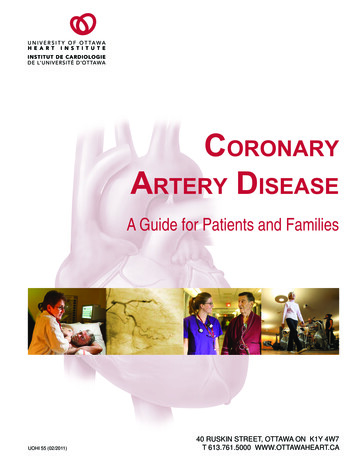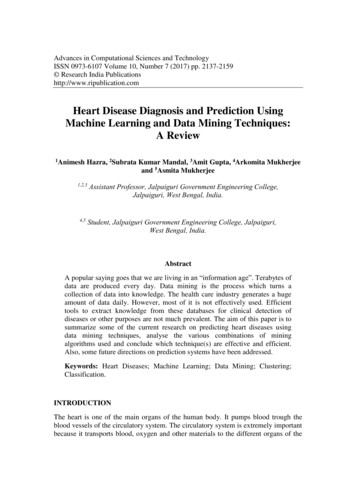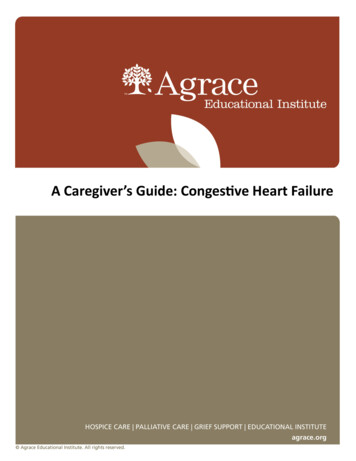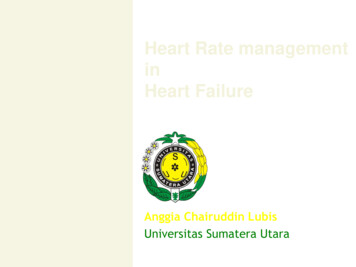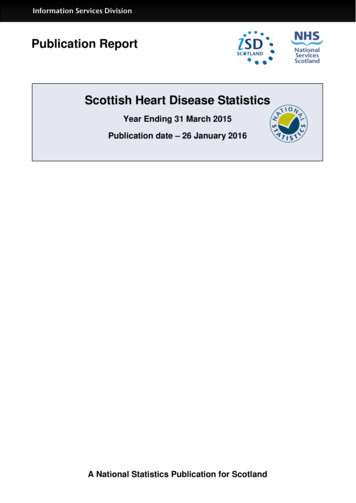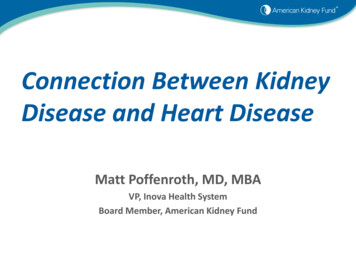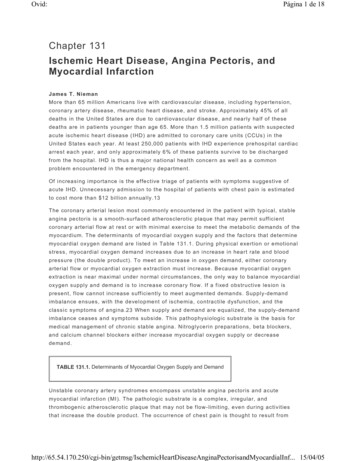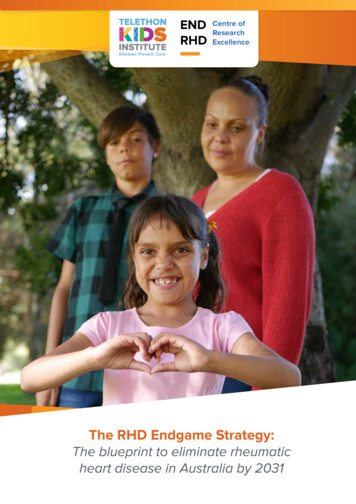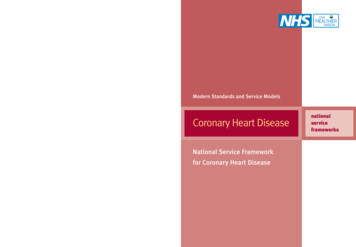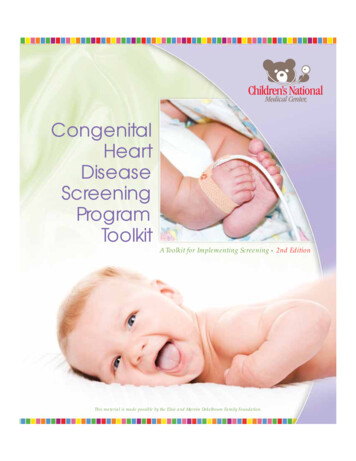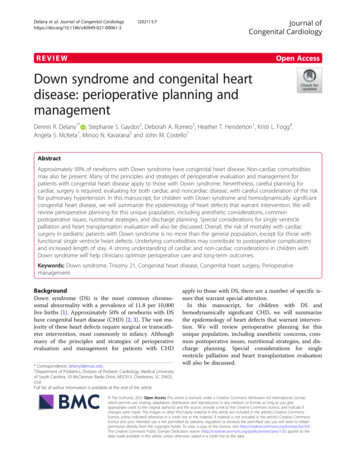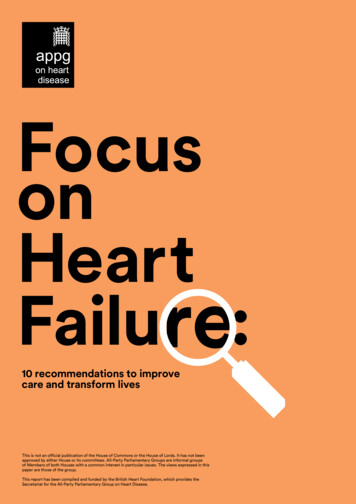
Transcription
FocusonHeartFailure:re10 recommendations to improvecare and transform livesThis is not an official publication of the House of Commons or the House of Lords. It has not beenapproved by either House or its committees. All-Party Parliamentary Groups are informal groupsof Members of both Houses with a common interest in particular issues. The views expressed in thispaper are those of the group.This report has been compiled and funded by the British Heart Foundation, which provides theSecretariat for the All-Party Parliamentary Group on Heart Disease.
ContentsForewordForewordAdvisory Panel12Summary ofRecommendations3Introduction4Diagnosis6Treatment & Care11Palliative Care17ForewordHeart failure can be a debilitating condition that has a considerableimpact on the lives of patients, their families and carers, and often resultsin unnecessary early death. It is also an increasingly common and costlycondition for the NHS.There is currently no cure for heart failure. But thanks to comprehensiveclinical guidelines we know how people should be diagnosed, treated andmanaged to significantly improve their outcomes and experience.Many people with heart failure receive excellent care, and there is much goodpractice and service innovation. But this is not happening consistently acrossthe country. The APPG undertook this inquiry to understand what the keyissues are, and what needs to happen to address them.I would like to thank all of those who took the time to provide evidenceto the inquiry – whether it was in writing, at one of the sessions in Parliament,or through one of the focus groups that we held – and in particular thepatients who were kind enough to share with us their personal experiencesof living with heart failure.I would also like to thank our Advisory Panel, which included individualsand representatives from organisations with expertise in heart failure,for their advice and guidance during the course of the inquiry.The recommendations in this report will help to improve the outcomesand experience of people living with heart failure. They will also help theGovernment and NHS to meet some of their objectives around, for example,improving out-of-hospital care and reducing unplanned admissions, as wellas improving the cost-effective use of resources at a time when these aretighter than ever.The APPG and the members of the Advisory Panel are keen to workcollaboratively with the Government and NHS to help implement theserecommendations, and make a tangible difference to the lives of peoplewith heart failure, and their families and carers.Stuart Andrew MPChair, All-Party Parliamentary Group on Heart Disease1
Advisory PanelSummary of RecommendationsSummary ofRecommendationsAdvisory PanelJennifer BaylyKent Surrey Sussex Academic Health Science NetworkProf Andrew ClarkBritish Society for Heart Failure (co-Chair)Richard CorderHeart failure patient, Cardiovascular Care PartnershipProf Martin CowieCardiologist, Imperial College LondonAngela GravesPumping Marvellous Foundation (co-Chair)Jacqui HuntBritish Association for Nursing in Cardiovascular CareDr Mike KnaptonBritish Heart FoundationDr Jim MooreGP with a special interest in heart failureJoel RoseCardiomyopathy UKDr Rick SteedsBritish Society of EchocardiographyWhat is heart failure?Heart failure is a complex clinical syndrome of signs andsymptoms that suggest the heart is not pumping blood aroundthe body as efficiently as it should. It is most commonly causedby damage to the heart muscle, for example as the resultof a heart attack, cardiomyopathy or related to high bloodpressure. It can also be caused by heart valve problems,congenital heart disease, a viral infection affecting the heartmuscle, an abnormal heart rhythm and some types of cancertreatment such as chemotherapy.Symptoms include breathlessness, fatigue and swellingas a result of fluid retention. Heart failure can be chronic,meaning the signs and symptoms develop gradually over time;or acute, meaning the signs and symptoms develop suddenly.Someone with chronic heart failure may also have episodesof acute heart failure.21.2.3.4.5.6.7.8.9.10.Health Education England should support heart failure specialist teams to improveawareness, knowledge and understanding of the condition in general medicalcolleagues, including GPs. This should cover the need to consider the historyof heart disease in the patient, and their family.All Clinical Commissioning Groups (CCGs) should commission cost-effectiveNTproBNP testing to support the diagnosis of heart failure. NHS England shouldconsider how CCGs can be incentivised to do this.NHS England and Health Education England should take urgent action to implementthe recommendations in the Strategic Review of Cardiac Physiology Services on meetingworkforce challenges, to ensure that demand for echocardiography can be met.Clinicians should ensure that when patients are diagnosed they are provided withinformation about heart failure, how it may impact on their lives, and how they can helpmanage this, in a form that is suitable for them. Patients should also be provided witha single point of contact for any questions and concerns.All patients admitted to hospital for heart failure should receive early specialist inputto their care. NHS England and NHS Improvement should seek improvements in thepercentage of patients receiving specialist input through the Best Practice Tariff forheart failure and expand it to include other measures such as follow up fromthe multidisciplinary team (MDT).Health Education England should work with the Royal College of Nursing, Nursing andMidwifery Council and others to build a picture of the number, location and qualificationsof heart failure specialist nurses (HFSNs) and other cardiac nurses treating people withheart failure; and urgently develop plans to ensure that the workforce is sufficientto meet demand.All CCGs should commission heart failure services centred on MDTs including HFSNs,to provide an integrated approach to care. NHS England should consider how CCGscan be incentivised to do this.All CCGs should commission exercise-based cardiac rehabilitation programmessuitable for heart failure patients and increase referrals to them. NHS England andNHS Improvement should expand their proposal for a Best Practice Tariff for cardiacrehabilitation to include appropriate patients with heart failure.As part of the Government’s commitment to offer people approaching the end of lifehonest discussions, Health Education England should work with professional bodiesto ensure all those caring for heart failure patients receive training in advancedcommunication skills.As part of the Government’s commitment to offer this opportunity to everyoneapproaching the end of life, CCGs and providers should ensure that all heart failurepatients can make informed personalised decisions about their careusing advanced care planning.3
IntroductionIntroductionIntroductionOver 400,000 people in England have been diagnosed with heart failure1and there are likely to be many more undiagnosed cases. Its prevalenceis likely to increase with the combined effect of an ageing population andimproved survival from heart attacks. Many people with heart failure areolder and will be living with multiple long term conditions. However, theinquiry also heard from younger people with heart failure, including thosethat developed the condition as a result of cardiomyopathy, congenitalheart disease and chemotherapy.Heart failure is a progressive condition for which there is currently no cure.Mortality rates are high. Nearly ten per cent of patients admitted to hospitalfor heart failure die in hospital, and nearly 30 per cent die within a yearof being discharged.2 Premature mortality from heart disease more widelyis higher in areas of social deprivation and health inequalities.3 Heart failurecan also have a significant effect on the quality of life of patients, theirfamilies and carers. As well as physical limitations, heart failure has anemotional, social and economic impact on those that live with it. Alongsidehealth services - including psychological support - patients may also needto access other help, for example social support.‘I have days when I get extremely fatigued for no apparent reason it’s as though someone has pulled a plug’Jennifer, 80,developed heart failure following a heart attack.‘Emotionally, I found it difficult to come to terms with the real truth thatI would perhaps have a shortened life.’Ross, 65,developed heart failure as a result of dilated cardiomyopathy.‘In order to do my job I needed to not work one day in six 50 per cent of that time in a whole year I had to take as unpaid leave.’Doug, 66,developed heart failure as a result of heart valve problems.In addition to the personal cost, heart failure is also costly to the NHS.It accounts for around two per cent of the total NHS budget – estimatedat about 2 billion4 - and one million patient bed days, each year.5 Heartfailure was the cause of over 63,000 emergency admissions in 2014/15.6It is the most common cause of admission in people over 65.7 The numberof admissions for heart failure is predicted to continue to rise withan ageing population. 8However, with the right treatment and care, the outcomes and experienceof people living with heart failure can be significantly improved. The costto the NHS associated with unplanned hospital admissions can also4be reduced. The National Institute for Health and Care Excellence(NICE) has developed evidence-based guidelines that set out how heartfailure should be diagnosed, treated and managed.9 But whilst manypeople with heart failure receive excellent care, many do not receivecare that meets these guidelines.‘What we can do for heart failure patients now at least doubles lifeexpectancy, and in many patients’ cases it restores a degree of normalityto life treatment is relatively simple, relatively cheap, and has a dramaticimpact on outcomes’Prof Andrew Clark,Chair of Clinical Cardiology and Consultant Cardiologist, Hull University.The health and care system currently faces huge financial challenges.10NHS England has identified a number of clinical priorities for the NHS,including cancer, mental health, diabetes, dementia, learning disabilitiesand maternity.11 Forty-four local health and care systems are workingtogether to identify and address the health priorities in their communitiesthrough Sustainability and Transformation Plans (STPs). Some, for examplein Greater Manchester, have been given more devolved powers fromGovernment and are integrating health and social care, including budgets.New models of care are being developed to support improvement andintegration of services. All of this presents both challenges and opportunitiesto improve services for heart failure, and the outcomes and experienceof patients. The 44 areas that have developed STPs should take accountof the recommendations in this report in implementing their plans.This inquiry was launched in March 2016. It has looked at diagnosis,treatment and care – both in hospital and the community – and palliativecare for people living with heart failure. It focussed on heart failure in adults.It did not cover the specific process and issues around transplantation.Evidence on the issues and solutions in these areas was received froma wide range of organisations and individuals with an interest and expertisein heart failure including patients and their families and carers, cliniciansand commissioners. Twenty-five pieces of written evidence were submitted,four evidence sessions were held in Parliament and two focus groups wereheld with patients. This evidence forms the basis of this reportand its recommendations.63,000emergencyadmissions for heartfailure in 2014/155
DiagnosisDiagnosisDiagnosisSharon Barnes’ StoryThe main steps in diagnosing someone with the signs and symptomsof heart failure are:I was diagnosed with asthma whenI had heart failure.— t aking a medical history, performing a clinical exam and other standardinvestigations such as a chest x-ray, blood tests, an electrocardiogram(ECG) which looks at the rhythm and electrical activity of the heart, andtests to check how well the lungs are working;— testing the level of natriuretic peptides in the blood; and if these are raised— performing an echocardiogram.People are often diagnosed with heart failure in hospital after an acute episode,whilst others are diagnosed by their GP, or as a result of referral by their GP.Diagnosis and mis-diagnosisEarly and accurate diagnosis is vital forensuring that people with heart failureget the treatment and care that they need.However, heart failure can be difficultto diagnose as the signs and symptomscan be caused by a number of conditions.Diagnosis can also be complicated by thefact that patients will often have other longterm conditions. Nearly a third of patientsadmitted to hospital for heart failurehave diabetes, and just under 20 percent have chronic obstructive pulmonarydisease (COPD).12 Many of the patientsthat the inquiry heard from told us theywere initially mis-diagnosed with otherconditions, such as chest infections,asthma, anxiety and stress.1.Many patients are also not asked abouttheir own, or their families’, history ofheart disease. Family history is particularlyimportant for those with inheritedconditions such as some cardiomyopathies.Thirty-eight per cent of respondentsto a survey conducted by CardiomyopathyUK said they were initially treated forother conditions, and 43 per cent saidthat they were not asked by their GPabout any family history of heart disease.13This can be a particular issue for youngerpatients who may be less obviouscandidates for heart failure. Respondentsalso said that their experience of beingdiagnosed affected their ability to copepsychologically with the diagnosis, andhow they felt about their subsequenttreatment and care.Health Education England should supportheart failure specialist teams to improveawareness, knowledge and understandingof the condition in general medicalcolleagues, including GPs. This shouldcover the need to consider the historyof heart disease in the patient,and their family.6“I started feeling unwell in August fouryears ago. But it took five months forme to get the right diagnosis of heartfailure - and the right treatment.The shortness of breath was the mostobvious thing. The GP thought it wasasthma and gave me inhalers. I wentto A&E with palpitations but theythought that was caused by the inhalers.I began feeling nauseous too. I wasgiven medicine for reflux but later foundout it was caused by my liver becomingenlarged. Once when my palpitationsand breathlessness were very badI dialled 999 but the paramedics saidit was a panic attack. By NovemberI wasn’t any better. I went on to the NHSDirect website and used the symptomchecker. It flashed up ‘dial 999 now’.I was taken to hospital where a chestx-ray showed my heart was enlarged.I was diagnosed with heart failure.It was such a relief finally to begin theright treatment.”7
DiagnosisDiagnosisNTproBNP testingNatriuretic peptides are hormonesthat are made by the heart. Raised levelsof natriuretic peptides in the blood canindicate that someone has heart failure.A simple test can measure the levelof natriuretic peptides in the blood.Where levels are normal, heart failurecan be ruled out. The degree to whichnatriuretic peptide levels are raised canalso indicate the severity of heart failure.NICE guidelines recommend measuringnatriuretic peptide levels in patients withsuspected heart failure.14 There are twotypes of natriuretic peptide that can bemeasured: testing for N-terminalproB-type natriuretic peptide (NTproBNP)is considered to be more reliable.2.8If a NTproBNP test shows that a patienthas raised levels of natriuretic peptidein their blood then NICE guidelinesrecommend that they be referred foran echocardiogram, performed onhigh resolution equipment by experiencedoperators trained to the relevantprofessional standards.20An echocardiogram is an ultrasoundof the heart. It is essential in confirminga diagnosis of heart failure, as well asits cause and the prospects of the patient.The timescales for referral depend onthe degree to which levels of natriureticpeptides are raised.21However, access to natriuretic peptidetesting is variable across the country. Theinquiry was told that in some areas it isnot commissioned at all, while in othersit is available in hospitals but not to GPs.Estimates suggest that up to a third of GPsand a third of hospital trusts do not haveaccess to natriuretic peptide testing.18 19All Clinical Commissioning Groups (CCGs)should commission cost-effective NTproBNPtesting to support the diagnosis of heartfailure. NHS England should consider howCCGs can be incentivised to do this.Implementingnatriuretic peptidetesting in primarycare could save 3.8 million a year.EchocardiographyThis is relatively inexpensive, costing under 28 per test, although the cost per testshould decrease as the number of testsperformed increases.15 In one particulararea, NTproBNP testing in primary carereduced the number of echocardiogramsand referrals by about 50 per cent.16 It isestimated that implementing natriureticpeptide testing in primary care in line withNICE guidelines could save 3.8 million.17There has been an average increaseof three to four per cent a year in demandfor echocardiography across the UK,22and it is anticipated that demand willcontinue to grow as a result of the ageingpopulation. However, there is a seriousshortage of staff to meet this demand.The vast majority of echocardiographyis carried out by cardiac physiologists.Their exact number is not known as theyare not coded separately to other scientificstaff in the NHS. The Department3.of Health commissioned a Strategic Reviewof Cardiac Physiology Services in Englandwhich projected a shortage of 663 wholetime equivalent posts out of 3650 totalpotential posts by 2018.23 Over 85 per centof departments offering cardiac physiologyservices report difficulties in recruitingqualified staff.24To qualify as an echocardiographer, NHSEngland currently requires entry into theScientist Training Programme. Followingthe introduction of the programme, theincrease in people specifically trainingin echocardiography has been small. In2016/17 there were 36 training posts on theScientist Training Programme for cardiacscience - however, based on previous yearsonly about half of these students will trainin echocardiography.25As a result of the gap between demandand supply, waiting times for bothurgent outpatient and inpatientechocardiography are frequentlylonger than recommended by NICE.26In order to address this, real progressneeds to be made in tackling the shortagein the echocardiography workforce.NHS England and Health Education Englandshould take urgent action to implement therecommendations in the Strategic Reviewof Cardiac Physiology Services on meetingworkforce challenges, to ensure that demandfor echocardiography can be met. 3.8m9
DiagnosisTreatment & CarePatient informationMany of the patients that the inquiry heardfrom said that no one had explained whathaving heart failure actually meant, andhow it would impact on their lives. In somecases, they had not explicitly been toldthey had heart failure. NICE guidelinesstress the importance of providing patientswith information about their condition,treatment and outlook that is tailoredto their needs and in a way they canunderstand.27Treatment & CareMany patients praised the informationprovided by organisations such asthe Pumping Marvellous Foundation,Cardiomyopathy UK and the BritishHeart Foundation. They also praised thepeer support groups they provided thathelped them deal with the emotional andpsychological impact of being diagnosedwith heart failure, and with managing theircondition. However, they often had to findinformation for themselves.Getting the right treatment and care is crucial to improving outcomes and qualityof life for people with heart failure, as well as helping to reduce hospital admissionsand the associated costs to the NHS.Patients will receive treatment and care in different places at different times. Patientsdiagnosed in hospital will receive treatment there before being discharged, and will thenbe cared for primarily in the community. Those diagnosed by their GP, or as a resultof referral by their GP, will be cared for primarily in the community. In both cases patientsmay be admitted to hospital for treatment of acute episodes, or other interventions, suchas having a device implanted in their chest to control their heart rhythm. This highlightsthe importance of, and need for, integration between primary and secondary care.“It is all very well being given a diagnosis,but at that moment, your world is turnedupside down, so whatever anyone saysto you, you might not remember in halfan hour’s time. You have many questions,but they do not always arriveat the right time either.”Specialist input in hospitalEighty per cent of patients admittedto hospital for heart failure are seenby a heart failure specialist – a consultantcardiologist, another consultant witha specialist heart failure interest, or a heartfailure specialist nurse (HFSN).This figurehas changed little over the last few years.28Sam, 43, developed heart failureafter a heart attack.4.Clinicians should ensure that when patientsare diagnosed they are provided withinformation about heart failure, how it mayimpact on their lives, and how they can helpmanage this, in a form that is suitable forthem. Patients should also be provided witha single point of contact for any questionsand concerns.10Patients seen by a heart failure specialistor treated on a cardiology ward aremore likely to receive treatment andcare that meets guidelines, for examplebeing discharged on all three medicinesrecommended for managing heart failure,and receiving follow-up from the heartfailure multidisciplinary team (MDT).Mortality rates for patients treatedon cardiology wards are lower: 7.1 per centdie in hospital compared to 10.4 per cent5.of those treated on general medical wards;and 25 per cent die within a year of beingdischarged, compared to 33 per cent forgeneral medical wards.29‘My want is that care across the countryis just more consistent. I have friends that have the same history and see a specialistevery time they go to hospital. Lotsof people do not.’Annette,developed heart failure as a resultof cardiomyopathy.A Best Practice Tariff for heart failurewas introduced in 2016/17 that providesa higher payment for heart failure carein hospitals where at least 60 per centof patients receive specialist input.30All patients admitted to hospital for heartfailure should receive early specialistinput to their care. NHS England and NHSImprovement should seek improvementsin the percentage of patients receivingspecialist input through the Best PracticeTariff for heart failure and expand itto include other measures such as followup from the MDT.11
Treatment & CareTreatment & CareMeeting guidelineson community careThe Heart Failure Audit only covers careprovided when a patient is admittedto hospital for heart failure. There isno national audit of the heart failure careprovided in the community, althoughsome areas do their own audit, oftenfacilitated by HFSNs. Anecdotal evidencesuggests that not all patients are receivingcare outside of hospital that meets NICEstandards – for example several patientsthat the inquiry heard from said that theydid not have a review of their conditionevery six months.The National Institute of CardiovascularOutcomes Research (NICOR), whichundertakes the Heart Failure Audit, isconsidering extending it to primary care,and a pilot project is underway. Extendingthe Heart Failure Audit in this way wouldprovide valuable information about howthe care people with heart failure receivein the community could be improved.Patient outcomes and experience measuresfor heart failure developed by theInternational Consortium for HealthOutcome Measures (ICHOM) are alsobeing considered for future inclusionin the Heart Failure Audit.31Heart failure specialist nurses(HFSNs)HFSNs help patients to manage theircondition, including assistance withtheir medication, providing educationon lifestyle changes such as diet and6.exercise, and providing psychologicalsupport. They also co-ordinate patients’care, helping them to access other servicesto meet their needs. Their role is oftenextended to include activities suchas undertaking physical examinations,prescribing, and palliative care. Evidenceshows that HFSNs can reduce hospitaladmissions and costs to the NHS, andimprove patients’ quality of life, as wellas facilitating better communication acrossprimary, secondary and community care.32The patients that the inquiry heard fromspoke highly of their HFSN, highlightingthe importance of having someone thatunderstands them and their condition andsupports them to manage it, as well asarranging other services and helping themnavigate the health and care system.However, the inquiry heard that accessto HFSNs is variable across the country.Anecdotal evidence suggests that someservices are being decommissioned, andother posts are being lost as nurses retireand are not replaced. Currently thereis no national definition of a HFSN, andthe skills and experience that are required,although this may be happening locally:the inquiry heard that a skills frameworkhad been developed in Cheshire andMerseyside. The exact number of HFSNs,where they are located, and their skilllevels, is not known. In Scotland thisinformation is available through theScottish Heart Failure Nurse Forum, whichmonitors HFSN posts against the ratioof one HFSN per 100,000 of the populationrecommended by the European Societyof Cardiology.33Julie Bartlett’s storyI think of my heart failure nurseas a really good friend.“I’m really lucky to have someoneas wonderful as Bethan. She’s a lifesaver. She keeps a really close eyeon me. For example my kidneys aren’tworking too well at the momentbecause my heart doesn’t workproperly. She can prescribe and shecan adjust my medication - the rightbalance of medication is criticalto the way you feel when you haveheart failure.I have a cardiology appointmentevery three months but she is therein between. Without her I would needmore visits to my GP, or more hospitaladmissions. But I can avoid that becauseshe is looking after me on a very regularbasis. I consider her to be someoneI can talk to and trust. I was completelyshocked to find out that not everyonewith heart failure who needs a specialistnurse has one. Because I just couldn’tmanage without Bethan.”Health Education England should workwith the Royal College of Nursing, Nursingand Midwifery Council and others to builda picture of the number, location andqualifications of HFSNs and other cardiacnurses treating people with heart failure;and urgently develop plans to ensure thatthe workforce is sufficient to meet demand.1213
Treatment & CareTreatment & CareA quarter of heart failurepatients treated on a cardiologyward will die within a yearof being discharged from hospital,compared to a third of patientstreated on a general medical ward.Multidisciplinary heart failureteams (MDTs)Many people with heart failure will needto access other services to help themmanage their condition and its impacton their life. The patients that the inquiryheard from spoke in particular about theneed for support to manage the emotionaland psychological impacts of heart failure.Some had been referred to psychologicalservices, some had received this supportfrom their HFSN, others had accessed peersupport services provided by organisationssuch as the Pumping MarvellousFoundation, Cardiomyopathy UK, andthe British Heart Foundation, whilst somerelied on their carer. Few patients hadreceived psychological support throughcardiac rehabilitation. Some patients saidthey had not received any such support.7.Community heart failure service, RotherhamIn Rotherham, the HFSNs in the team have extended roles and responsibilities.They refer patients for a range of tests and procedures, diagnose heart failure andinitiate treatment. Patients are triaged as green, amber or red. ‘Green’ patients aredischarged to the care of their GP with a management plan. All discharged patientsreceive three monthly text reminders about self-monitoring and contacting the serviceif symptoms deteriorate. ‘Amber’ and ‘red’ patients are cared for by the team in clinicsor at home. Patients are offered a heart failure education and learning programme,heart support group, heart failure exercise programme and encouraged to makeuse of resources provided by other organisations. ‘Amber’ patients are also offeredtelehealth, which includes a 12 week electronic education programme. The HFSNsare also trained in palliative care.‘My feeling from reflecting upon theexperience I have had as a heart failurepatient in both hospital and the communityis a lack of acknowledgement of thepsychological aspects of the disease andhow this then impacts on the physicalprogression of the disease.’Maya, 49,developed heart failure followinga heart attack.NICE guidelines recommend that heartfailure care should be delivered by an MDTwith an integrated approach across thehealthcare community.34 This should ensurethat the wider needs of patients with heartfailure are addressed.All CCGs should commission heart failureservices centred on MDTs, which includeHFSNs, to provide an integrated approachto care. NHS England should considerhow CCGs can be incentivised to do this.14The inquiry heard about several serviceinnovations that have helped to improvepatient outcomes and experience, whilstreducing hospital admissions and coststo the NHS. However, the APPG wasconcerned to hear that the cardiovascularStrategic Clinical Networks (SCNs) willno longer be supported by funding fromNHS England. Some excellent work hasbeen undertaken by the car
Secretariat for the All-Party Parliamentary Group on Heart Disease. Focus on Heart Failure:re. Foreword Advisory Panel Summary of Recommendations Introduction Diagnosis Treatment & Care Palliative Care 1 2 . approaching the end of life, CCGs and providers should ensure that all heart failure patients can make informed personalised decisions .
